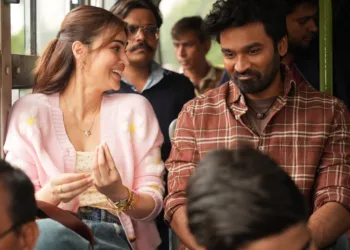The beloved 2013 film Raanjhanaa has been re-released in Tamil Nadu with an AI-generated “happy” ending, sparking backlash from director Aanand L Rai.

While producers call it a creative reimagining, the move has ignited heated debate over artistic rights, technological overreach, and the future of cinema storytelling.
Table of Contents
Raanjhanaa Returns with AI-Generated ‘Happy’ Ending
In a bold yet controversial move that may mark a first for Indian cinema, the 2013 romantic tragedy Raanjhanaa has returned to theatres in Tamil Nadu—but with an unexpected twist. This time, the ending isn’t the heartbreaking one audiences remember. Instead, the Tamil dubbed version, Ambikapathy, now features an AI-generated “happy” ending, replacing the original tragic climax where the protagonist dies.

The decision to introduce this alternate ending has sparked a fierce debate between creative authenticity and technological advancement. Director Aanand L Rai, known for his emotionally resonant storytelling, is heartbroken and outraged by the modification—labeling the move a “dystopian experiment.”
A Heartfelt Story, Now AI-Tweaked
Originally set in the culturally rich cities of Varanasi and Delhi, Raanjhanaa follows the story of Kundan (played by Tamil superstar Dhanush), a Hindu boy hopelessly in love with Zoya (Sonam Kapoor), a Muslim girl. The film’s original ending—where Kundan is shot at a political rally and dies in the hospital—was lauded for its emotional depth and tragic realism.

Now, over a decade later, the film’s Tamil version has been altered by Upswing Entertainment, in collaboration with Eros Media World, to feature a more “audience-friendly” climax powered by AI. “The timeless love story returns to the big screen! #Ambikapathy re-releasing in theatres from August 1st… A new ending powered by AI,” — Upswing Entertainment via social media .
Aanand L Rai Breaks Silence
Rai, who directed Raanjhanaa from a screenplay by Himanshu Sharma, did not mince words in expressing his anguish over the unconsulted change. “I’m heartbroken that this is the future we’re heading toward, where intent and authorship are disposable. All I can do is dissociate myself from such a reckless and dystopian experiment,” Rai said in a statement to PTI.

He further criticized the producers for violating the emotional and artistic sanctity of the film: “Raanjhanaa didn’t need a new climax. It had heart, and honesty. It became a cult film because people connected to it with its flaws, and imperfections. To see its ending altered without a word of discussion is a gross violation—not just of the film, but of the trust of the fans who’ve carried the film in their hearts for 12 years.”
Rai also raised serious concerns about image and personality rights, stating: “Even worse is their apparent decision to alter the actors’ contributions without their consent! How can they digitally manipulate an actor’s input almost a decade after a film’s release?”
Eros Media World Defends Its Stance
In contrast, Eros Media World framed the AI-edited version as a tribute, not tampering. According to Group CEO Pradeep Dwivedi: “This is a creative reimagining, not a replacement, and is consistent with global industry practices including anniversary editions, alternate cuts, and modernised remasters.”

The company emphasized its legal ownership and copyright over Raanjhanaa, asserting: “The reinterpretation has been developed with sensitivity and respect for the original creative team’s contribution… The producer of a cinematographic work, under Indian law, is its legal author and moral rights vest with the producer—not the director.”
They insisted that the alternate version is clearly labeled and not intended to replace the original, much like “director’s cuts” or anniversary re-releases seen in Hollywood.
What’s Next for Rai and Dhanush?
Despite distancing himself from the re-release, Aanand L Rai continues his creative journey with actor Dhanush. The duo is teaming up for a spiritual follow-up to Raanjhanaa titled Tere Ishq Mein, which stars Kriti Sanon and is set for global release on November 28.

Raanjhanaa and the AI Reimagining
| Year | Event |
|---|---|
| 2013 | Raanjhanaa releases in Hindi; Tamil dubbed version titled Ambikapathy |
| 2024 | Upswing Entertainment and Eros Media World announce AI-generated alternate ending for Tamil re-release |
| August 1, 2025 | Re-release hits theatres in Tamil Nadu |
| November 28, 2025 | Tere Ishq Mein set for release |

The Raanjhanaa AI-edit controversy has opened up critical conversations around artistic integrity, copyright law, and the ethics of AI in cinema. As Indian filmmakers and producers increasingly turn to technology to enhance storytelling, one question remains: At what cost does innovation come, especially when it rewrites the legacy of a story that once moved millions?
Read More: Karl Urban Brings Johnny Cage to Life in Action-Packed Mortal Kombat 2 Trailer
FAQs
Why was Raanjhanaa re-released with a new ending?
To present an AI-generated alternate ending aimed at increasing audience engagement in regional markets.
Who approved the AI-powered change to the film?
Eros Media World, the producer and legal copyright holder of the film.
Did Aanand L Rai approve of the new ending?
No, he strongly opposed the change and called it a “dystopian experiment.”
What is the new ending in the Tamil version?
The tragic death of Kundan has been replaced with a more optimistic AI-generated outcome.
Is this the first time an Indian film has used AI to alter its ending?
Yes, this is likely the first known case in Indian cinema of an AI-driven alternate ending being released theatrically.








